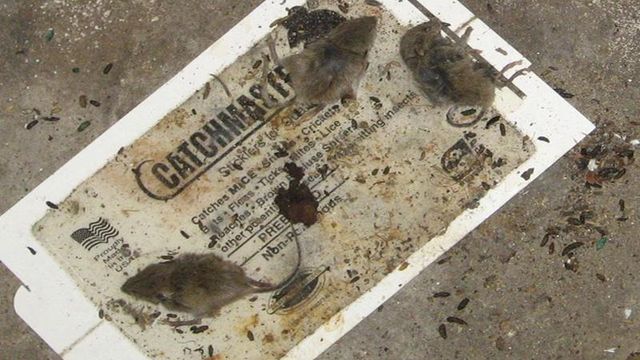RALEIGH, N.C. — Outbreaks of salmonella and recalls of food from stores, most recently associated with hundreds of products containing peanut butter, have raised concerns about the how safe foods are and about the measures in place to keep them safe.
At an IGA at 2971 Wendell Blvd., in Wendell, for example, inspectors found 11 decomposing mice below a shelf displaying bread, bagged stuffing and ice cream cones and 10 others in a storage room, according to a
March letter. It goes on to describe finding thousands of rodent droppings in the facility.
In another case, at a Lowe's Foods at 2900 Millbrook Road in Raleigh, inspectors seized more than 3,200 food items from shelves after finding hundreds of live and dead weevils on products, according to a
September letter. At the same store in 2007, inspectors found rodent droppings on and inside boxes in a storage room.
At the Rite Aid at 1910 Falls Valley Drive in Raleigh, a peanut butter cup came out of the package with a worm on top of it. An inspector also found moth larvae on the retail shelves, according to an
August letter. Twenty-seven packages of candy were seized for moth infestation.
Each company says it has since resolved its problems, though inspectors continue to work with IGA to make sure the problems do not occur again, its owner says. (View their responses to the inspection reports.)
Joe Reardon, director of the division, says the agency's goal is to inspect all grocery stores once a year.
With 27 inspectors, though, Reardon says it is a struggle to get to each of the 9,000 facilities they inspect on the schedule he’d like.
"Grocery stores – we'd like to be in every 12 months," Reardon said. "Many cases today, that's every 18 months. Many of the facilities we'd like to be in every six months – it's 9 or 12 before we get in there."
Last year, the department asked lawmakers for six more inspectors, but funding for the positions was denied.
For 2009-10, it is asking for five positions – two food inspectors, two chemists and one microbiologist. Because of state budget cuts, however, it's uncertain whether funding for the positions will be in next year's budget.
So, how safe is the food North Carolina consumers buy and use?
Ben Chapman, a food safety extension specialist at North Carolina State University, says it's a tough question to answer.
About 76 million people in the United States each year get food- or water-borne illnesses, Chapman says. He says enforcement, alone, will not make the public safer. Companies that deal with food and food products must be educated, too.
But he says the detective work to trace problems is certainly getting better.
"Ten years ago, we might not have seen as many solved outbreaks," he said. "But that's not to say there were less outbreaks."
Last year, state inspectors set off a nationwide recall when they found salmonella on jalapeños and avocados at a Charlotte produce company. They were looking for signs of salmonella on tomatoes from other states at the time.
Including the salmonella scares from jalapeños last year and the most recent scare involving peanut butter products, the Centers for Disease Control and Prevention has reported six multi-state outbreaks of salmonella infections.





